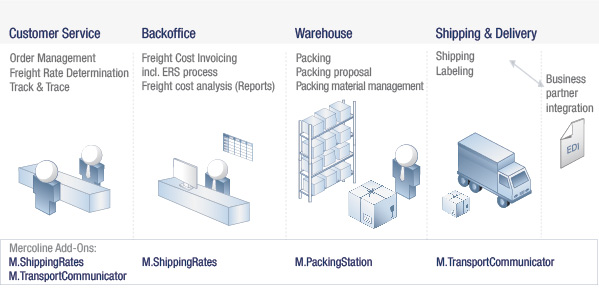There is still significant room for improvement in logistics processes, especially at many medium-sized companies, where media disruptions between IT solutions, unnecessary manual effort and paper-based processes still represent the status quo. Increased legal requirements such as Entry Certificates and electronic customs declarations pose further complications. As such, the Bender company from Grünberg, Germany relies on consistent, SAP-supported work processes, reaping the benefits with measurable success.
![[Translate to englisch:] Produktion bei Bender](/fileadmin/images/kunden/stories/Produktion-Bender.jpg)
"When we used to transfer our products to a transport service provider for shipment, we had to process each shipment twice. First, we processed everything in the SAP system, then we filled out another declaration and registration form, this time from the transport service provider. Not only did this amount to double the effort, the manual entry of addresses was susceptible to errors," explains Bender GmbH Logistics Department Manager Markus Bieker. With some 700 employees worldwide, Bender is a pioneering market leader for electrical safety products, as well as for a broad range of solutions for various industrial sectors. Bender needed a suitable solution to completely process everything in the company’s SAP ERP system.
Goal: Complete management of shipment statuses within SAP ERP
Bender needed a specific solution: "We were looking for a way to save time and have immediate access to all of the data needed to trace shipments around the world. We wanted every Bender employee to be able to track shipment statuses using Track & Trace," says Bieker.
This requirement exceeded the standard options available in SAP ERP, since as a mid-sized company, Bender was also required to provide the interfaces to each of its transport service providers (TSP).
The Mercoline M.TransportCommunicator was just the solution Bender needed. Today, Bender uses it to process dispatch orders for courier, express and parcel services (CEPs) as well as for shipping companies.
Solution: Add-on for shipments sent through transport service providers
The M.TransportCommunicator is an SAP ERP add-on based on SAP standard structures. It provides CEP interfaces to all relevant transport service providers, and doesn’t require a separate update when the SAP system is upgraded. Bender now directly processes all of its dispatch orders to CEPs and shipping companies within its SAP ERP system. A plausibility check for the entered data is automatically conducted for every shipment. Once the order is complete, the finished shipment label is printed individually for each CEP or shipping company. The electronic data for manifests or tracking data is then exchanged with the CEPs and shipping companies directly from Bender’s SAP ERP system.

Expanding capabilities: Including the packaging process in SAP
The packaging process has been fully integrated into Bender’s SAP ERP system. According to Bieker, "Instead of a complicated processing procedure in SAP, we now simply use a barcode scanner to scan required data such as document numbers or packaging materials via the Mercoline M.PackingStation module. This has simplified and accelerated the process."
Employees can now see all the orders in a logistics monitoring overview, and status tracking of shipments sent via shipping companies and CEPs is now conducted straight from the SAP ERP system. The system can also transmit tracking links that enable customers to track shipments.
Using synergies for automated Entry Certificates
Because every shipment’s data is available in the Mercoline M.TransportCommunicator add-on, Bender can use these data for Entry Certificates and customs declarations.
Entry Certificates can be created automatically, because the CEP interfaces for all relevant service providers are already in the system. The application, which is also integrated in the SAP ERP system, generates the required data from SAP documents, such as delivery notes. The electronically integrated transport service providers automatically report the subsequent transfer of a package, and the SAP ERP application uses this information to create an Entry Certificate document.
"Because Entry Certificates are now processed and archived automatically, we no longer have to manually search through e-mails or Excel charts for the documents," says Bieker.
SAP integration for processing ATLAS customs declarations
"Now we can also process electronic customs declarations entirely in the SAP ERP system. The application sifts the required information from existing master data and documents, saving us a great deal of time and effort. Everything is immediately available and understandable, even for employees filling in for people on vacation," says Bieker, praising the benefits of this data link.
"We enjoy significant benefits because the connections to our transport service providers, as well as to the packaging, Entry Certificate and customs declaration processes, are all interlinked and come from a single provider. These sophisticated applications are absolutely reliable, enabling us to save a few minutes of processing time on each shipment. We're very satisfied with this solution," says Bieker.